Cane Toad World is located in the small town of Gordonvale, just outside the major tourist centre of Cairns, in Australia, and is my New Tourist Attraction of the week.
And this one is a bit bizarre!
Cane Toad World – A Monument to an Introduced Pest!
A Short Cane Toad History Lesson
Cane Toads were imported from Hawaii to Australia in the 1930’s to help control the Cane Beetle grub, which was affecting the cash crop of sugar cane. The were first introduced in the north Queensland area.
Unfortunately, no one figured out that the cane beetle could fly, and that the toads had not evolved wings to hunt them down and eat them.
Hence, with no predators, the toad multiplied dramatically and now their range extends southwards into New South Wales, and west into the Northern Territory.
To give you an idea of distance, that’s about 2000 kilometres (about 1300 miles) south and west of the introduction point!
These tough and pesky invasive species will live anywhere water is.
There are numerous examples of other stories like this – such as introducing Beavers into South America.
They’re also destructive for native wildlife. Cane Toads will eat anything that will fit into their mouth. Here is an example from Cane Toads – An Unnatural History, which was shot in 1987. They will even eat a Ping Pong Ball.
These poisonous amphibians have been wreaking havoc on Australian wildlife ever since.
Also, their skin contains a poisonous chemical that kills potential predators like snakes and birds. This poison is concentrated in glands near the eyes.
What’s ironic is that one of the chemicals excreted by the cane toad, called Bufotenin, is classified as a Class 1 drug under Australian law, alongside heroin and marijuana. Bufotenin can cause hallucinations, and since Cane Toads excrete this chemical in small amounts, licking one could result in serious illness or death.
If you are caught with the pure form of this substance, a lengthy jail sentence awaits you.
Anyway, with all this dodgy history, I found it funny that an entire park section had been devoted to the environmental pest – which includes a sand pit and playground!
Here are some photos! First of all is the mural!
The Environmental message!
Then there is the sand pit with slippery slides!
If you’re really into biology, you can check out The Cane Toad: The History and Ecology of a Successful Colonist.
More Cane Toad Stuff
There you go! The next time you are in northern Australia, you can visit Cane Toad World! Also note, Cane Toad is Australian Slang for Queenslander!
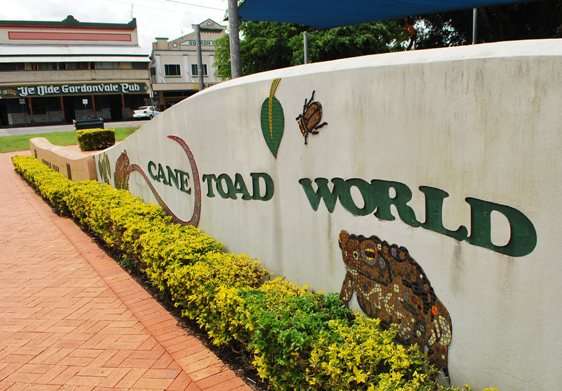
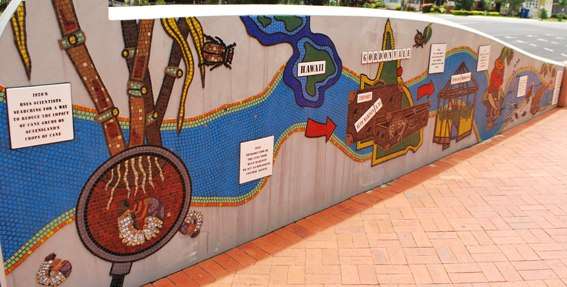
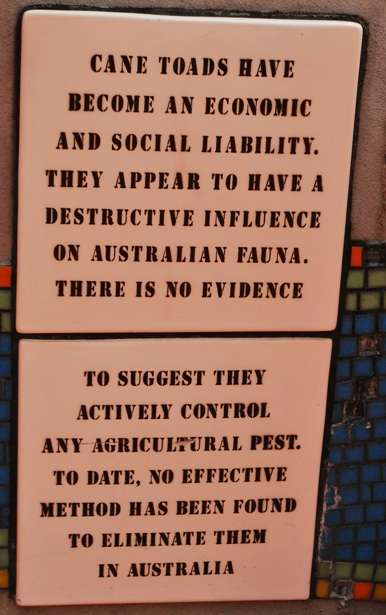
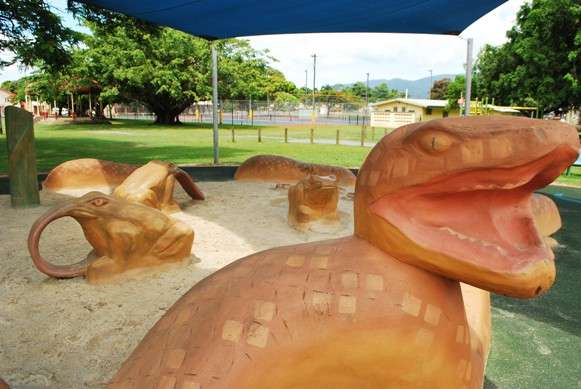
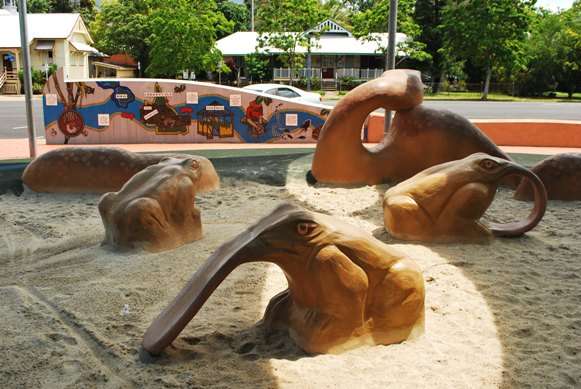
I didn’t know that one could actually get high licking a toad. I thought it was just a rumor. Now I know!
.-= Kyle´s last blog ..Innocuous Sign or Commentary on Modern Love? =-.
Not sure if I want to try it though! Sounds terrible!
Toad attraction. Who would ever think of such a concept!
As a lot of us would say “only in north queensland”
Oh and for Elimination.. Of course we have many home found remedies to erradicate or should i say as an attempt to control these pests. Lets see…
1. the fire cracker in ones mouth –
2. the golf club – toad golf
3. Salt – sprinkled over ones lovely speckled leather leaves the old bugger worse for wear
4. And last but not least – Car tyres. The wider the tyre tbe better the effect. Need to get them front on or as they smile down the headlights – nothing like a little snap crackle and POP
Have you tried all of these?
I don’t know about cane toads, but this website layout is very appealing. I love the picture of the guy at the top– so colorful and fun!
I sent in about 30 + ideas to catch Cane Toads to the CTAP. Waiting for response after the 16, June, 2010 deadline. Are there any Au or Au State plans seeking safer and cheaper techniques and devices to catch crocs and / or wild dogs? From CANADA Kenneth Hilliam [email protected]
.-= Kenneth Hilliam´s last blog ..Burning Man Fesitval – Oddballs! =-.
this is a must go place for children and their family to gain more knowledge and have at the same time
If you live further south, say Victoria, the cane toad is not viewed as a predator any longer as it is now just part of the landscape in the tropical regions of Australia. Sad that these beautiful creatures are so far away from their home and are mostly viewed as a pest.